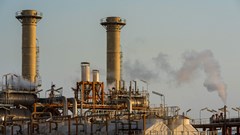Aramco May Buy Stake in Sempra US Gas Plant, Get LNG Supply
(Bloomberg) -- Saudi Aramco expanded its drive to tap into US energy supply with an initial agreement to buy a stake in Sempra’s Texas liquefied natural gas export plant in a deal that would include fuel shipments from the project.
The state oil producer in Saudi Arabia signed a non-binding agreement to purchase a 25% stake in phase two of Sempra’s Port Arthur LNG export plant, according to a statement. Aramco would also take delivery of five million tons of LNG a year over two decades. Sempra and Aramco said they expect to reach a binding agreement.
Gulf oil producers Saudi Arabia and the United Arab Emirates are tapping into export projects in the US as they add to their portfolios for supply of the fuel. The two countries are pumping cash into domestic gas production to meet power and industrial demand at home, while building trading operations to ship internationally-sourced LNG. Neighboring Qatar, which is almost doubling its own LNG export capacity, also has stakes in US projects.
“This agreement is a major step in Aramco’s strategy to become a leading global LNG player,” Nasir Al-Naimi, president of Aramco’s upstream business, said in the statement.
Aramco earlier this month made its first deal to purchase LNG from the US, signing a 20-year non-binding contract to take 1.2 million tons per year of LNG from NextDecade Corp.’s planned project in Texas.
Saudi Arabia isn’t new to the US energy scene: the country has been a major crude supplier to the US for half a century and Aramco owns the largest refinery in the nation. The latest agreement with Sempra is almost identical to a deal Aramco signed in 2019 for a stake in phase 1 of the Port Arthur project and supply from that facility. That non-binding agreement expired after Aramco decided not to pursue the deal as the impacts of coronavirus-linked lockdowns ravaged energy markets.
Aramco also bought LNG assets in Australia that would provide its traders with closer access to markets in Asia.
Saudi Arabia is the world’s biggest crude exporter and the de facto leader of the Organization of Petroleum Exporting Countries. Along with other producers led by Russia, the wider OPEC+ group has been restricting production for years to shore up oil markets.
With massive investment plans requiring trillions of dollars, Saudi Arabia is looking to expand revenue sources while ensuring a share of the evolving energy market. Many energy producers see gas as a cleaner-burning transition fuel that could lower emissions if it can displace dirtier energy sources like coal. Still, potential leaks along the LNG supply chain of harmful gases including methane could limit some of that benefit.
(Updates with comment from statement in fourth paragraph.)
©2024 Bloomberg L.P.
KEEPING THE ENERGY INDUSTRY CONNECTED
Subscribe to our newsletter and get the best of Energy Connects directly to your inbox each week.
By subscribing, you agree to the processing of your personal data by dmg events as described in the Privacy Policy.
More gas & LNG news

BP’s Turnaround Plan Tested by Weak Earnings, Falling Shares

Woodside gives green light to massive Louisiana LNG project

China Re-Exports Record Monthly Volume of LNG on Weak Demand

Alaska LNG project aims to transform US energy exports to Asia

US Eyes Post-War Joint Business With Russia in Energy, Metals

Hedge Funds Seek Out Ways to Navigate Trump’s Anti-Climate Agenda

China May Exempt Some US Goods From Tariffs as Costs Rise

Spain Wants EU to Keep Methane Goals in Search for LNG Supplies

Booming Power Demand Means Longer Wait for GE Vernova Customers
















